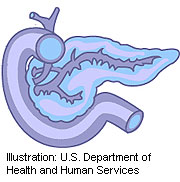
MONDAY, Jan. 25 (HealthDay News) — Researchers have identified four regions of the human genome that predict a heightened risk of pancreatic cancer as a result of what they describe as the biggest-ever sweep of the genome for genes related to the disease.
Though some of the locations had been linked to other cancers, the discovery of others apparently surprised the researchers.
“This lets us go places we had never thought of before,” said senior study author Dr. Stephen Chanock, chief of the laboratory of translational genomics at the U.S. National Cancer Institute.
However, he cautioned that though the regions “are conclusively associated with the risk of developing pancreatic cancer, it doesn’t mean if you have a variation in that region you’re going to get pancreatic cancer.”
It simply means risk is increased, and, more than likely, environmental factors would have to come into play to complete the picture, he explained.
The findings were reported online Jan. 24 in Nature Genetics.
Pancreatic cancer has an extremely grim prognosis, with only 5 percent of people still alive five years after detection.
“Pancreatic cancer is often diagnosed at a very late stage, and that’s partly due to anatomical location,” Chanock said. “The disease can fester and grow for extended periods of time before it impinges on a vital structure that produces symptoms, and we have not developed sufficiently good ways to identify people at risk with tests.”
Smoking, a history of diabetes and weight problems all can contribute to risk, as can a family history of the disease, although family clusters account for less than 5 percent to 10 percent of all pancreatic cancers, he added.
But only recently have scientists begun to unravel the myriad genetic factors that might trigger the disease.
After analyzing genes in close to 4,000 people with pancreatic cancer and an equivalent number of people without the disease, the investigators identified three genetic regions associated with a greater risk for the cancer.
Combined with previous work, the discovery gives scientists four particular areas of interest in understanding the disease.
The first genetic location plays an important role in ABO blood types, something scientists had suspected even before the genetic connection was made.
The second location is in a region of chromosome 5 that harbors a gene important for telomeres, structures at the end of chromosomes that get shorter each time a cell divides.
“The telomerase gene has already been identified in lung cancer, brain cancer, skin cancer and leukemia, and it’s associated with a rare lung disease and blood disorders,” Chanock said. “This seems to be pointing toward a ‘soft spot’ in the human genome — that there’s something about genetic variation in that region that can predispose toward a number of different diseases.”
The question now is why someone with this predisposition would develop lung cancer rather than skin cancer, and that’s where environmental cues probably come into play, Chanock said.
The other two regions — on chromosomes 1 and 13 — are “enigmatic,” Chanock said. “They are new places we’d never thought of in pancreatic or any type of cancer.”
Dr. Michael Hall, director of the gastrointestinal cancer risk assessment program at Fox Chase Cancer Center in Philadelphia, described the study as “a monumental effort to gather this many samples.”
“The findings were very consistent and, I think, very believable,” Hall said. “The next question becomes what do you do with that information. Once this starts to get meshed together with what other people have found, the impact is going to be greater.”
And as Chanock explained, researchers now are faced with the laborious task of making sense of the findings and figuring out how to use them to reduce risk.
“It’s more complicated than just using markers to predict risk,” Chanock said. “Some work together, some work against each other. It will take more studies to move toward risk profiles that will help us to figure who’s at greater or lesser risk for pancreatic cancer and who might need certain types of tests or to visit their doctor more frequently, or who would be candidates for a trial of chemoprevention.”
More information
The U.S. National Cancer Institute has more on pancreatic cancer.

